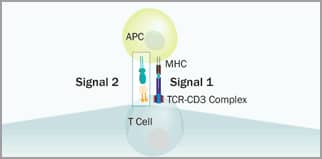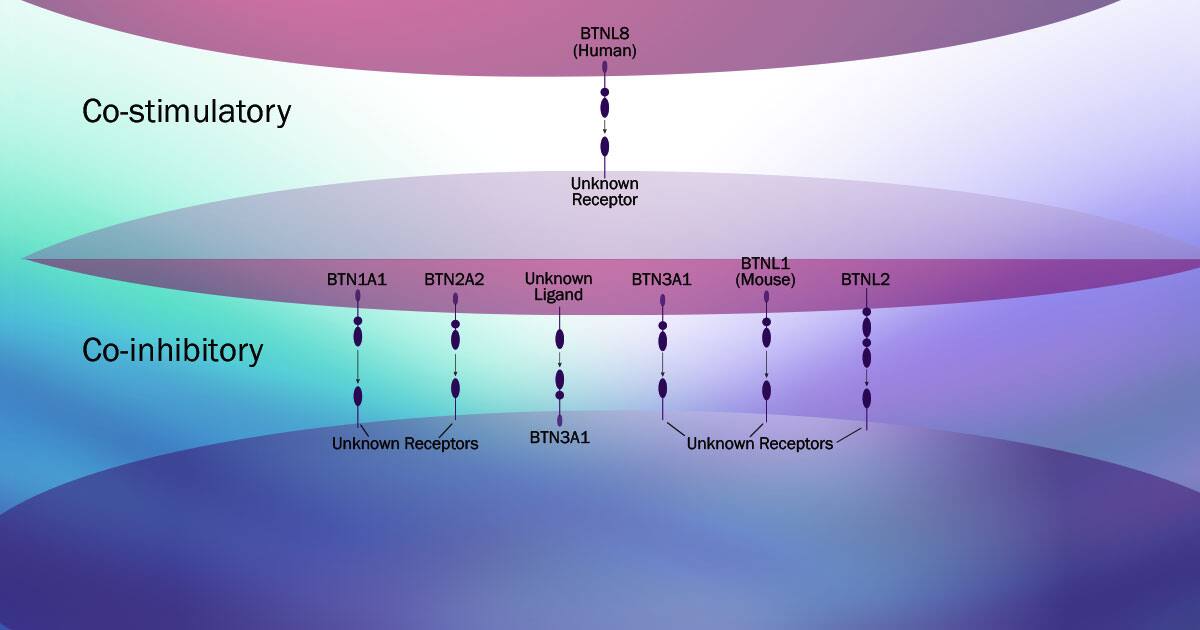Butyrophilins, Cancer, and Inflammation

The butyrophilins are closely related in structure to the B7 family proteins and appear to have similar immunomodulatory functions. To date, thirteen human butyrophilin proteins have been identified including BTN1A1, BTN2A1, BTN2A2, BTN2A3, BTN3A1, BTN3A2, BTN3A3, and the butyrophilin-like proteins, BTNL2, BTNL3, BTNL8, BTNL9, BTNL10, and SKINT-like (SKINTL). Most butyrophilins that have been characterized to date, including human BTN1A1, BTN2A2, BTN3A1, BTNL2, and mouse BTNL1, act through unidentified receptors to inhibit T cell proliferation and cytokine production. The exception is BTNL8 which enhances T cell proliferation and cytokine secretion.
So What’s New??
Lebrero-Fernandez et al., wanted to further understand the role of these proteins in inflammation and cancer. They undertook a systematic real time PCR (qPCR) analysis of BTN and BTNL expression in the context of ulcerative colitis (UC), irritable bowel syndrome (IBS) and colon cancer using tissue collected from humans and mouse model systems. In the normal human colon, BTN1A1, BTNL2, and BTNL9 expression was lower than the other transcripts. Normal mouse colon showed more variable transcript expression. Btnl1 and Btnl4 expression was very high while Btn2a2 and Btnl9 expression was very low or undetectable. Btn1a1, Btnl2, and Btnl6 expression was intermediate between the two extremes. The authors next examined the effect UC and IBS on BTN and BTNL expression in human tissue. They observed increased BTN1A1, BTN2A2, BTN3A3, and to a lesser extent, BTN3A2 in UC tissue relative to normal and IBS tissue. Conversely BTNL8 expression was decreased in UC tissue relative to normal and IBS tissue. Although BTN expression was unchanged in human colon cancer tissue, all of the BTNL transcripts that were tested (BTNL2, BTNL3,BTNL8 and BTNL9) exhibited a statistically significant decrease, relative to adjacent normal colon tissue. The authors also observed a statistically significant decrease in Btn1a1, Btnl1, Btnl4, Btnl6 and Btnl9 in the distal colon of mucin deficient mice that spontaneously develop colitis. Btnl1, Btnl4, and Btnl6 also showed statistically significant decreases in the middle colon. Increased Btn1a1 and Btn2a2 were observed in intestinal polyps from transgenic mice that spontaneously develop tumors. Conversely Btnl1 expression was decreased in intestinal polyps from transgenic mice relative to controls.
What are the implications of this data? Altered expression of these transcripts in the context of cancer or inflammation support the idea that in addition to being co-stimulatory/co-inhibitory molecules, Butyrophilins may be worthwhile cancer biomarker candidates or drug targets. More work is needed to understand the role of these novel proteins.
